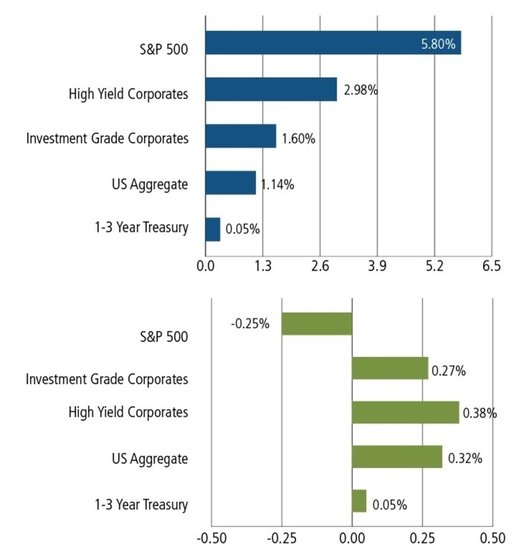-April 21, 2017 Weekly Market Roundup. Equity markets rallied this week as strong earnings results helped elevate investor confidence. The S&P 500 ended the week up +0.87% and the Dow Jones finished up +0.57%. Thus far, 19% of companies in the S&P 500® Index have reported earnings results; of these, 65% have exceeded analysts’ sales estimates, while 76% have exceeded analysts’ earnings per share (EPS) estimates. Treasury yields remain near 2017 lows as U.S. government debt has continued to rally over geopolitical concerns.
-April 13, 2017 Weekly Market Roundup. Equities retreated for the week as “saber rattling” and geopolitical concerns weighed on investors. Defensive areas of the market, including large cap companies, outperformed while sectors that reflect economic conditions, such as Financials, Materials, and Industrials, lagged. Demand for “safe haven” investments rose, including gold which rose to its highest price since the presidential election, a 14% rally from its December low. Meanwhile, the CBOE Volatility Index jumped about 30% this week on overall greater investor trepidation, its highest point since last November.
-We remain cautious on current client portfolio positions given the escalation of military activities. For example, the U.S. is playing with fire with soon-to-be military exercises off the coast of North Korea, when Kim Jung-on (who is crazy) promises to unleash a "nuclear-tipped missile." We are equally concerned that Syria, Russia, Iran and Hezbollah have aligned against western forces on the Syrian matter. Thus, as to investing right now, we are also not putting more cash to work. In fact, if conflict events escalate & turn south, then we will be pulling some “risk-on” assets into treasuries. However, that would only be a temporary asset allocation shift in event military conflict ensures, as markets typically recover about two weeks after. “In 14 shocks dating (back) to the attack on Pearl Harbor in December 1941, the median one-day decline has been 2.4%. The shocks, which also include the September 11th terror attacks and the 1962 Cuban missile crisis, lasted eight days, with total losses of 7.4%…The market recouped its losses 14 days later.” Chris Isidore, “Impact of War On Stocks and Oil,” CNN Money, 9/3/2013
-According to the index firm MSCI, the performance of high yielding equities when the Fed raised rates offer protection. It turns out that over the 88 years through July 2015, when 10-year rates have been low (less than 3%), high-yielding stocks have outperformed the market by an annualized 2.4% as the Fed tightened.
